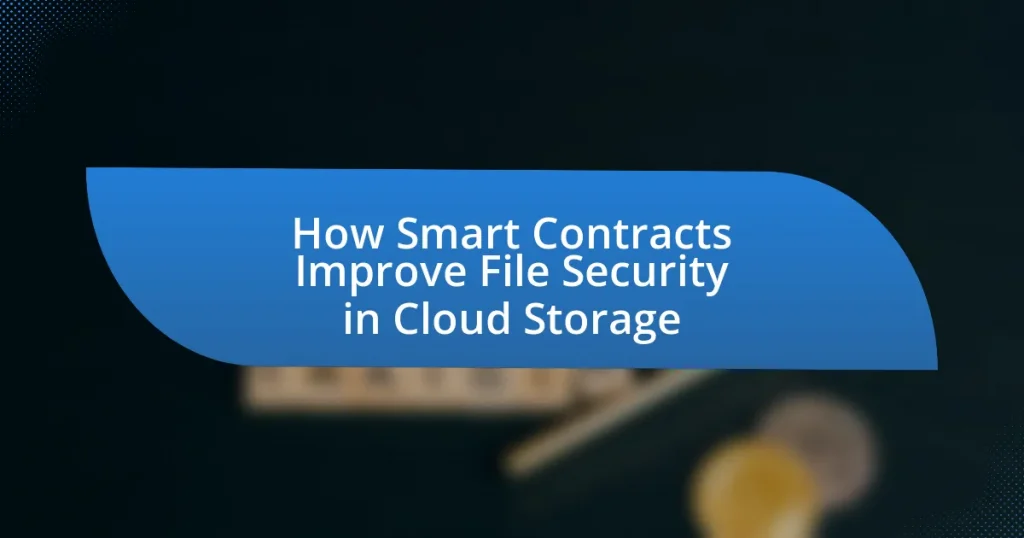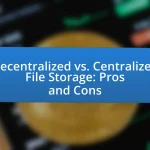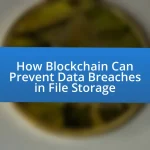Smart contracts are self-executing agreements coded on a blockchain that enhance file security in cloud storage by automating access controls and ensuring data integrity. They function by executing predefined conditions, such as granting file access only when specific criteria are met, thereby reducing the risk of unauthorized access and data breaches. Key components include automated execution, security protocols, and decentralized verification, which collectively improve file security. The article also addresses common threats to file security in cloud storage, the limitations of traditional security measures, and best practices for implementing smart contracts to mitigate risks associated with file sharing and enhance accountability in transactions.
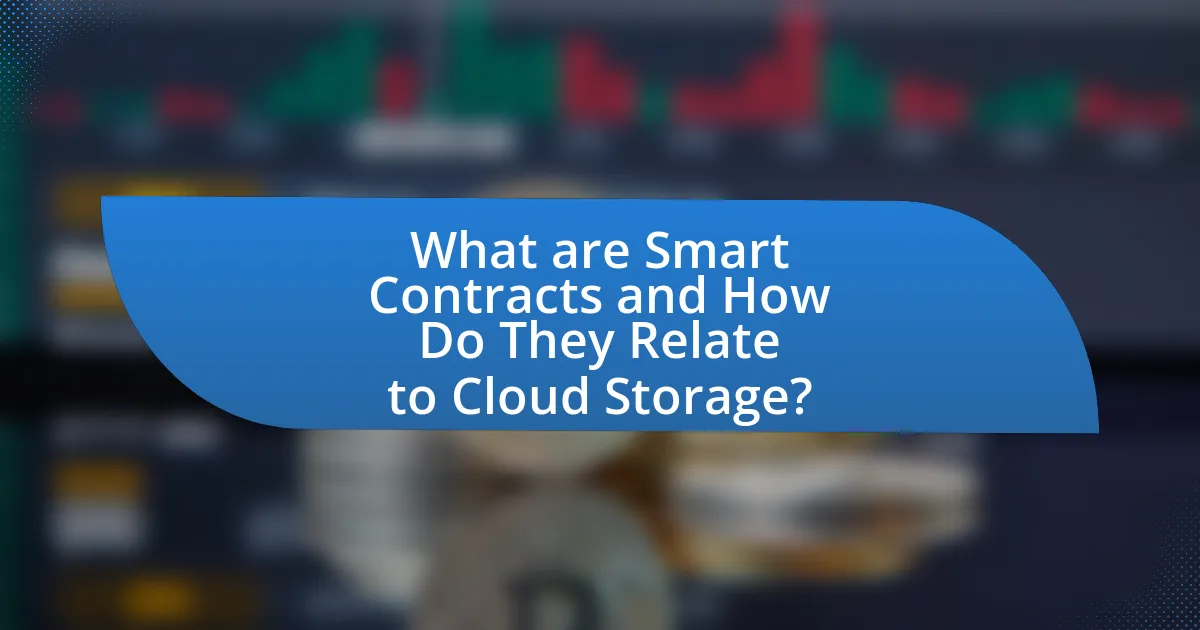
What are Smart Contracts and How Do They Relate to Cloud Storage?
Smart contracts are self-executing contracts with the terms of the agreement directly written into code, typically on a blockchain. They facilitate, verify, and enforce the negotiation or performance of a contract automatically without intermediaries. In relation to cloud storage, smart contracts enhance file security by ensuring that access permissions and data transactions are executed only when predefined conditions are met, thereby reducing the risk of unauthorized access or data breaches. For instance, a smart contract can automatically grant access to a file only when a payment is confirmed, ensuring that sensitive data is only shared under secure and agreed-upon conditions. This integration of smart contracts in cloud storage systems leverages blockchain’s transparency and immutability, providing a robust framework for secure data management.
How do smart contracts function in the context of cloud storage?
Smart contracts function in cloud storage by automating and enforcing agreements between users and service providers without intermediaries. They execute predefined conditions, such as file access permissions and payment terms, directly on a blockchain, ensuring transparency and security. For instance, when a user uploads a file, a smart contract can automatically manage access rights, allowing only authorized users to retrieve the file, thus reducing the risk of unauthorized access. This mechanism enhances file security by providing an immutable record of transactions and conditions, which can be audited and verified, ensuring that all parties adhere to the agreed terms.
What are the key components of smart contracts in cloud storage?
The key components of smart contracts in cloud storage include automated execution, security protocols, and decentralized verification. Automated execution allows contracts to self-execute when predefined conditions are met, ensuring efficiency and reducing the need for intermediaries. Security protocols, such as cryptographic hashing and encryption, protect data integrity and confidentiality during storage and transfer. Decentralized verification involves consensus mechanisms that validate transactions across a distributed network, enhancing trust and reducing the risk of fraud. These components collectively contribute to improved file security in cloud storage environments.
How do smart contracts ensure data integrity in cloud storage?
Smart contracts ensure data integrity in cloud storage by automating and enforcing the terms of data handling through immutable code on a blockchain. This automation eliminates the risk of human error and unauthorized access, as the smart contract executes predefined actions only when specific conditions are met. For instance, when data is uploaded or modified, the smart contract can verify the integrity of the data against a hash stored on the blockchain, ensuring that any unauthorized changes are detected immediately. This mechanism is supported by the inherent properties of blockchain technology, such as decentralization and cryptographic security, which collectively provide a robust framework for maintaining data integrity in cloud storage environments.
Why is file security a critical concern in cloud storage?
File security is a critical concern in cloud storage because sensitive data is vulnerable to unauthorized access, breaches, and data loss. The reliance on third-party providers for data management increases the risk of exposure, as evidenced by numerous high-profile data breaches, such as the 2017 Equifax breach, which compromised the personal information of approximately 147 million individuals. Additionally, the shared nature of cloud environments can lead to potential data leaks if proper security measures are not implemented. Therefore, ensuring robust file security is essential to protect sensitive information and maintain user trust in cloud storage solutions.
What are the common threats to file security in cloud storage?
Common threats to file security in cloud storage include data breaches, unauthorized access, data loss, and insider threats. Data breaches occur when malicious actors exploit vulnerabilities to gain access to sensitive information, often resulting in significant financial and reputational damage. Unauthorized access can happen due to weak passwords or inadequate authentication measures, allowing unauthorized users to manipulate or steal data. Data loss may result from accidental deletion, hardware failure, or natural disasters, leading to permanent loss of critical files. Insider threats involve employees or contractors misusing their access to compromise data integrity or confidentiality. According to a 2021 report by IBM, the average cost of a data breach is $4.24 million, highlighting the financial impact of these threats.
How do traditional security measures fall short in cloud storage?
Traditional security measures fall short in cloud storage primarily due to their inability to address the unique vulnerabilities associated with distributed environments. Conventional security protocols, such as firewalls and antivirus software, are designed for on-premises systems and often fail to protect against threats like data breaches, insider attacks, and unauthorized access that are prevalent in cloud infrastructures. For instance, a 2021 report by the Cloud Security Alliance indicated that 64% of organizations experienced a cloud security incident, highlighting the inadequacy of traditional measures in mitigating risks specific to cloud environments. Additionally, traditional measures often lack the scalability and flexibility required to adapt to the dynamic nature of cloud services, leaving organizations exposed to evolving threats.
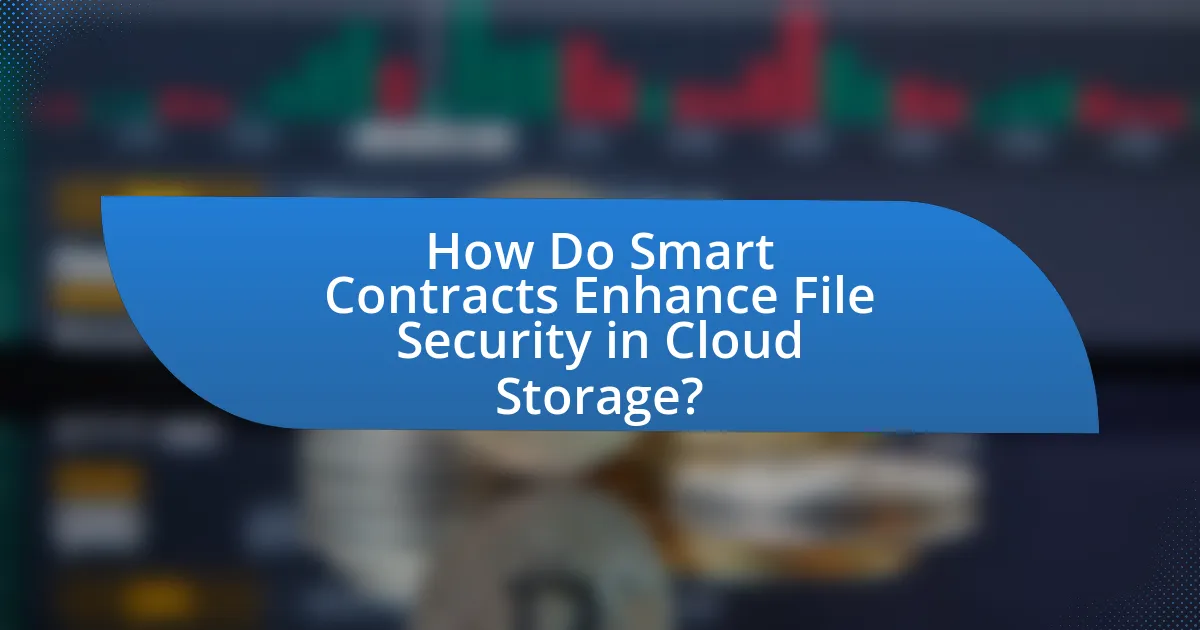
How Do Smart Contracts Enhance File Security in Cloud Storage?
Smart contracts enhance file security in cloud storage by automating and enforcing access controls and data integrity through blockchain technology. They ensure that only authorized users can access or modify files, as permissions are encoded in the contract and executed automatically upon predefined conditions being met. This reduces the risk of unauthorized access and data breaches, as the contract’s immutable nature prevents tampering. Additionally, smart contracts can facilitate secure transactions and audits, providing a transparent and verifiable record of all interactions with the stored files, thereby reinforcing accountability and trust in the cloud storage environment.
What specific security features do smart contracts provide?
Smart contracts provide several specific security features, including immutability, transparency, and automated execution. Immutability ensures that once a smart contract is deployed on a blockchain, its code cannot be altered, preventing unauthorized changes. Transparency allows all participants to view the contract’s terms and conditions, fostering trust among users. Automated execution eliminates the need for intermediaries, reducing the risk of human error and fraud. These features collectively enhance the security of transactions and data management in cloud storage environments.
How do smart contracts facilitate access control in cloud storage?
Smart contracts facilitate access control in cloud storage by automating permission management through predefined rules encoded on a blockchain. These contracts ensure that only authorized users can access specific files or data, as they execute access permissions based on the conditions set within the contract. For instance, a smart contract can stipulate that a user must possess a certain digital key or meet specific criteria to gain access, thereby eliminating the need for centralized control and reducing the risk of unauthorized access. This decentralized approach enhances security and transparency, as all access attempts and permissions are recorded on the blockchain, providing an immutable audit trail.
What role do smart contracts play in data encryption?
Smart contracts facilitate data encryption by automating the execution of encryption protocols based on predefined conditions. They ensure that data is encrypted before being stored in the cloud, thereby enhancing security and privacy. For instance, when a user uploads a file, a smart contract can automatically trigger the encryption process, ensuring that only authorized parties can access the data. This process is validated by the blockchain, which provides an immutable record of the encryption actions taken, thereby reinforcing trust in the security measures implemented.
How do smart contracts mitigate risks associated with file sharing?
Smart contracts mitigate risks associated with file sharing by automating and enforcing agreements between parties without the need for intermediaries. This automation reduces the likelihood of human error and fraud, as the terms of the contract are executed exactly as programmed. For instance, smart contracts can ensure that files are only shared with authorized users, and access can be revoked automatically if conditions are not met, thereby enhancing security. Additionally, the use of blockchain technology provides a transparent and immutable record of all transactions, which further protects against unauthorized access and data tampering. This combination of automation, authorization, and transparency effectively addresses common risks in file sharing scenarios.
What mechanisms do smart contracts use to prevent unauthorized access?
Smart contracts utilize several mechanisms to prevent unauthorized access, primarily through cryptographic techniques, access control protocols, and decentralized consensus. Cryptographic techniques, such as public and private key encryption, ensure that only authorized users can interact with the contract, as they must possess the correct private key to execute transactions. Access control protocols define specific permissions for users, allowing only designated parties to execute certain functions within the contract. Additionally, decentralized consensus mechanisms, like those used in blockchain networks, validate transactions through a majority agreement among nodes, making it difficult for unauthorized entities to alter contract terms or access sensitive data. These combined mechanisms create a robust framework that significantly enhances file security in cloud storage environments.
How do smart contracts ensure accountability in file transactions?
Smart contracts ensure accountability in file transactions by automating the execution of agreements based on predefined conditions, which are recorded on a blockchain. This automation eliminates the need for intermediaries, thereby reducing the risk of human error or manipulation. Each transaction is time-stamped and immutable, meaning that once a file transaction is executed, it cannot be altered or deleted, providing a transparent and verifiable record of all actions taken. This transparency allows all parties involved to audit the transaction history, ensuring that obligations are met and enhancing trust among users.
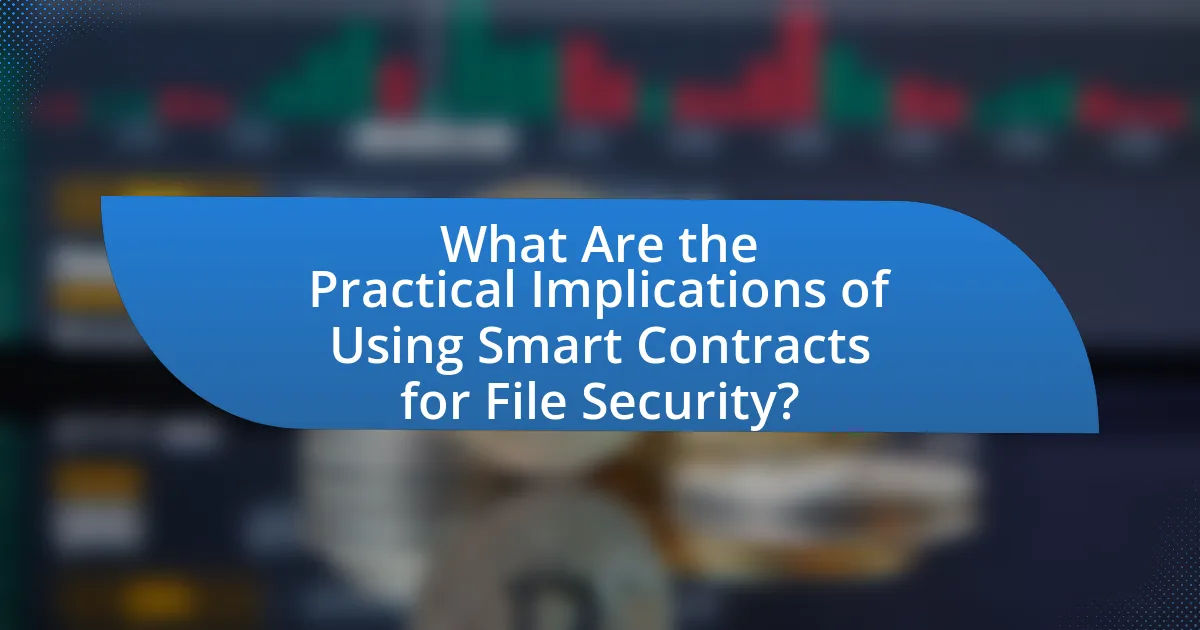
What Are the Practical Implications of Using Smart Contracts for File Security?
The practical implications of using smart contracts for file security include enhanced data integrity, automated access control, and reduced risk of unauthorized modifications. Smart contracts operate on blockchain technology, which ensures that once a contract is deployed, it cannot be altered, thus maintaining the integrity of the files. Additionally, smart contracts can automate permissions, allowing only authorized users to access or modify files, which streamlines the management of file security. According to a study by the World Economic Forum, blockchain technology, including smart contracts, can reduce data breaches by up to 80%, highlighting their effectiveness in securing sensitive information in cloud storage environments.
How can businesses implement smart contracts for enhanced file security?
Businesses can implement smart contracts for enhanced file security by utilizing blockchain technology to automate and enforce agreements related to file access and sharing. Smart contracts can be programmed to define specific conditions under which files can be accessed, ensuring that only authorized users can retrieve or modify sensitive information. For instance, a smart contract can stipulate that a file is only accessible if a user meets certain criteria, such as possessing a valid digital signature or completing a multi-factor authentication process. This approach not only reduces the risk of unauthorized access but also creates an immutable record of all transactions, providing an audit trail that enhances accountability and transparency. According to a report by Deloitte, the use of smart contracts can significantly reduce the potential for fraud and data breaches, thereby improving overall file security in cloud storage environments.
What are the best practices for integrating smart contracts in cloud storage solutions?
The best practices for integrating smart contracts in cloud storage solutions include ensuring robust security measures, implementing clear governance protocols, and utilizing standardized contract templates. Security measures should involve encryption of data and secure key management to protect against unauthorized access. Governance protocols must define roles and responsibilities for all stakeholders, ensuring accountability and compliance with regulations. Standardized contract templates facilitate consistency and reduce errors, making the integration process more efficient. These practices enhance the reliability and security of cloud storage solutions, as evidenced by the increasing adoption of blockchain technology in data management, which has shown to reduce data breaches by up to 80% according to a study by IBM.
What challenges might organizations face when adopting smart contracts?
Organizations may face several challenges when adopting smart contracts, including technical complexity, legal uncertainty, and integration issues. The technical complexity arises from the need for specialized knowledge in blockchain technology and programming languages, which can hinder implementation. Legal uncertainty stems from the evolving regulatory landscape surrounding smart contracts, as existing laws may not adequately address their use, leading to potential disputes. Integration issues occur when organizations attempt to incorporate smart contracts into existing systems, which may require significant changes to infrastructure and processes. These challenges can impede the effective deployment of smart contracts in enhancing file security in cloud storage.
What future trends can we expect in smart contracts and cloud storage security?
Future trends in smart contracts and cloud storage security include increased automation through decentralized finance (DeFi) protocols and enhanced interoperability between blockchain networks. As smart contracts become more prevalent, they will facilitate automated transactions and agreements, reducing the need for intermediaries and minimizing human error. Additionally, advancements in cross-chain technology will enable seamless data sharing and security across different blockchain platforms, enhancing the overall security of cloud storage solutions. According to a report by Gartner, by 2025, 70% of organizations will be using smart contracts to automate business processes, indicating a significant shift towards reliance on these technologies for secure data management.
How might advancements in blockchain technology impact smart contracts?
Advancements in blockchain technology could significantly enhance the functionality and security of smart contracts. Improved scalability and interoperability of blockchain networks can facilitate faster transaction processing and seamless integration with various platforms, thereby increasing the efficiency of smart contracts. For instance, Ethereum’s transition to a proof-of-stake consensus mechanism has already demonstrated reduced energy consumption and increased transaction throughput, which directly benefits smart contracts by enabling quicker execution and lower costs. Additionally, advancements in cryptographic techniques, such as zero-knowledge proofs, can enhance privacy and security in smart contracts, allowing sensitive data to be processed without revealing it on the blockchain. This is particularly relevant in cloud storage, where protecting file security is paramount.
What innovations are on the horizon for file security in cloud storage?
Innovations on the horizon for file security in cloud storage include the integration of smart contracts, advanced encryption techniques, and decentralized identity management. Smart contracts automate security protocols, ensuring that only authorized users can access files, thereby reducing the risk of unauthorized access. Advanced encryption techniques, such as homomorphic encryption, allow data to be processed without being decrypted, enhancing privacy and security. Decentralized identity management systems provide users with control over their personal data, minimizing the chances of data breaches. These innovations are supported by ongoing research and development in blockchain technology and cryptography, which aim to create more secure and efficient cloud storage solutions.
What are the key takeaways for improving file security with smart contracts?
Key takeaways for improving file security with smart contracts include implementing access control mechanisms, ensuring data integrity through cryptographic hashing, and automating compliance with predefined security policies. Access control mechanisms allow only authorized users to interact with files, reducing the risk of unauthorized access. Cryptographic hashing ensures that any changes to the file can be detected, maintaining data integrity. Additionally, smart contracts can automate compliance checks, ensuring that all security protocols are followed consistently, which is crucial for maintaining a secure cloud storage environment. These practices collectively enhance file security by leveraging the inherent features of smart contracts.
